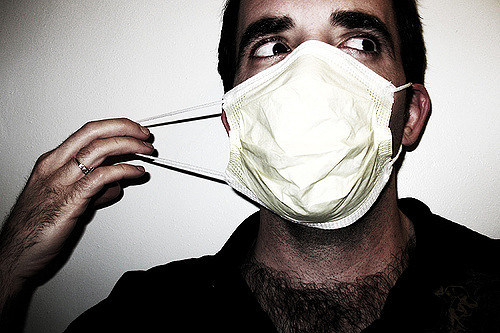Fall will soon be upon us, and with it comes signature autumnal fashion. Boots! Scarves! Chunky sweaters! Surgical masks! Wait, what? With flu season just around the corner, don’t be surprised to see your fellow humans bust out surgical masks as their newest style statement. But how much of an impact do surgical masks actually have in mitigating the risk of spreading infection? Let’s take a closer look.
First of all, this is a typical surgical mask.
They can come in a variety of styles, but they typically include a fabric covered filter along with a fastening mechanism. Surgical masks can be evaluated based on their bacterial filtration efficiency percentage (BFE %), which determines how well the surgical mask’s filter can keep airborne pathogens out. Typically, surgical masks have a BFE around 98%.
But as it turns out, surgical masks have not yet been universally proven to be statistically significant in mitigating the spread of infectious disease. In fact, they seem to have no effect on preventing environmental viruses.
Image Source: Morsa Images
Surgical masks can keep out larger particles, like droplet-mediated viruses, very effectively. The pore size is small enough to protect against typical body fluids excreted during coughing, sneezing, or blowing your nose. However, small airborne pathogens, like the kinds associated commonly with the flu or other viruses, can still pass through the mask. In these cases, surgical masks provide little to no protection.
Still, surgical masks are an important protection measure, not just for individuals looking to avoid getting sick, but also individuals who want to protect their community members from their own illnesses. In addition, surgical masks are integral in the hospital setting. Surgeons wear masks to avoid contaminating patients on the operating table. The masks also provide hospital workers and technicians protection against splashes and projections of blood or other bodily fluids.
N95 respirator masks have smaller pores than regular surgical masks and may be better at keeping out some smaller airborne pathogens. While surgical masks may help prevent droplet-mediated disease, they have not yet been proven to prevent other types of infections. So this fall, it’s up to you to figure out whether a surgical mask would complement your “OOTD”.
Feature Image Source: 127 Wednesday – isolation – by roujo










